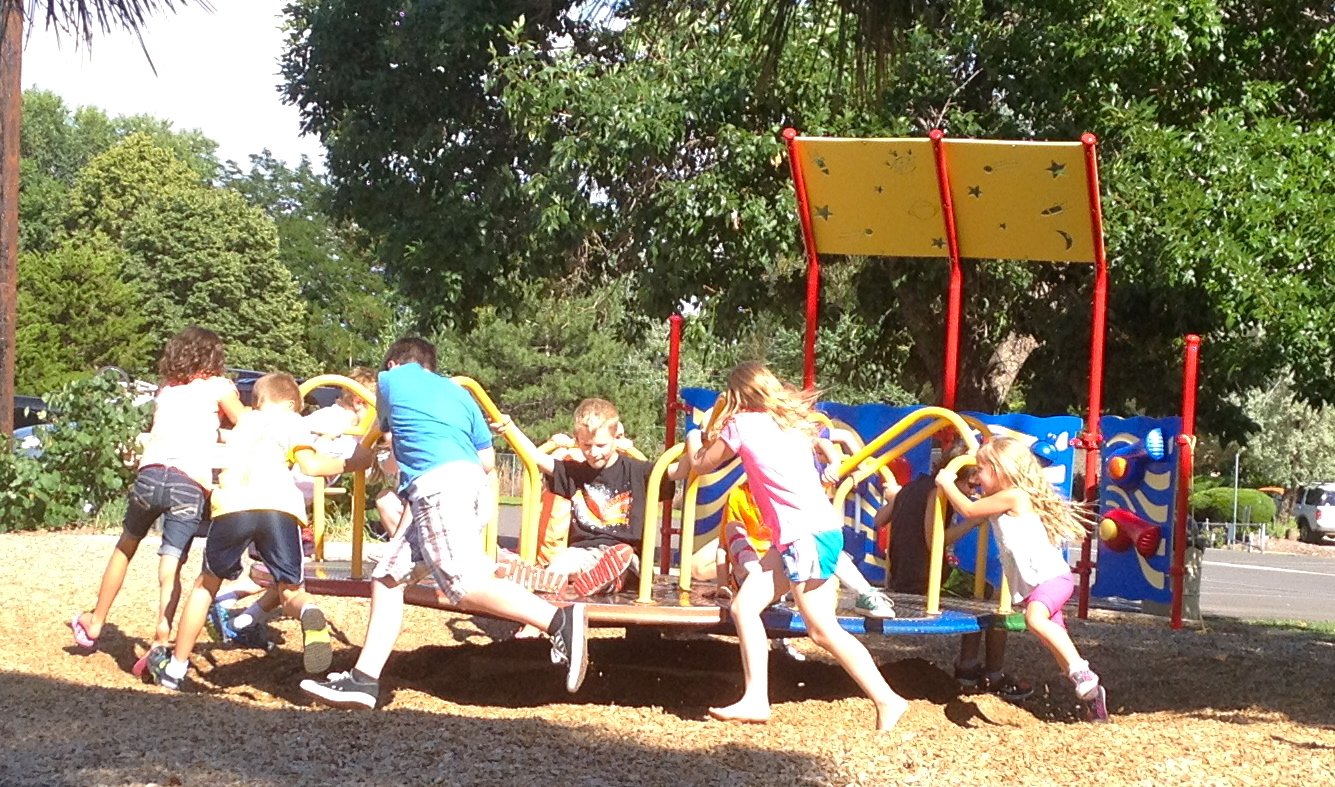My kids stink, today anyway. They smell like sweat, dirt, grime; the kind of kid-smell that says they’ve been running hard, playing rough, non-stop all-day-long kind of playing. They smell like kids are supposed to smell.
Kids don’t smell stinky enough these days.
My kids started full on with all the neighbor kids at about 10:00 this morning and they’re still going at almost 7:00 pm. There’ve been little breaks here and there as they grabbed a bite of food or a sip of water and then raced back into the fray.
Earlier, there were 14 of us—including three parents—walking, running to the park, climbing over the fence, to play soccer, basketball, baseball, groundies, to swing and play on the merry-go-round (yep, our park still has one of those!) Then we came back home for a spur-of-the-moment neighborhood BBQ and they’ve continued with Nerf gun wars, tag, hide-and-seek and a classic game of sardines (remember that one??)
I remember these days from my childhood—when we’d have a group of kids at our house, all the parents visiting inside, and we’d just go and go and go—never needing jackets, never feeling hungry or tired, just thriving in the all-out pushing hard play-time that we lived for. Kick the can, tag, jumping off my Dad’s retaining wall, hide-and-seek, (first kisses during hide-and-seek). This is the kind of play that brings the neighbors out to look, and they end up with these wistful smiles on their faces, remembering their own youth. It surprises them, though, because they haven’t seen it much in a while.
Kids smell too good these days — they smell like designer clothes and hair products, and not like kid-sweat and dirt. They smell like days in front of screens and sitting on couches. They smell like organized sports instead of random play where kids learn all about social rules and kindness and getting along and problem solving and conflict resolution and communication—this is where life is learned. Not that I’m against organized sports—my kids play them and learn a whole lot about discipline and structure, work ethic and dedication, and team-work and commitment. But they don’t learn the basics—like who makes the rules, who’s going to be the leader, how to deal with hurt feelings and disagreements. They don’t learn how to work together to make sure everyone’s included and they don’t get to practice different hierarchical social roles. They don’t really figure out how they fit in the whole scheme of things.
Maybe more play-time really is the key.
All mammals NEED play to survive! We even have a whole brain system dedicated to PLAY. Yet not only do many adults forget how to play, we’re forgetting to teach our kids–or sometimes, we forget to let our kids teach us.
So how about we dedicate some time to teaching our kids how to get dirty, how to play hard, to push themselves, and to stink! Here are some of my suggestions (and reminders for myself, as well as anyone else). What are yours?
#1 UNPLUG
You know the drill—shut down the devices, turn off any screen within miles that you can access. Don’t ask and don’t argue—just make the rule and turn it all off. I have difficulty with this at times too, because screens can be such an easy way to make them happy…. in the moment. But kids are not only, not learning how to play hard; their bodies aren’t developing what they need to be able to play. Loads of screen time leads to a lack of vestibular function (balance) and inhibited proprioception (knowing where our bodies are in space). A lot of kids these days really struggle with sensory integration issues and simple coordination, many, simply because their bodies don’t have the chance to practice. And the overstimulation of sensory mechanisms trying to integrate the images and speed from screens is completely messing with our kiddos body-brain development. Not to mention it’s setting them up for future addictive habits, as they use it (just like their parents) as a means of avoidance—of feeling and life. So turn it off!
#2 PLAY WITH THEM
Kids will have so much more fun, and feel so much more confident playing, if parents are playing with them. And ultimately, they don’t follow my Dad’s old adage—“Do what I say, not what I do”—kids do exactly what they see their parents doing! They mirror our movements, reflect our personalities, and follow our lead. So PLAY. Have fun with them—get dirty and grimy and stinky with them. Let go of the “to-do” lists, and dig deep into your own kid-nature–They’ll love you so much for it.
#3 LET THEM FIGURE IT OUT
Kids are going to argue and fight about who’s going to push the merry-go-round, about what game to play, about who’s the ruler in the tree fort—hopefully without getting physical—they’re going to yell and cry and get their feelings hurt, and they’re going to get embarrassed, shy, insecure, and frustrated. They’re supposed to. If we rescue them, they’ll lose interest and they’ll stop trying those strategies (because that is exactly what those behaviors are—albeit unconsciously) for themselves. They’re also going to make friends, create their pack, feel connected and secure and valued. This is how they learn to navigate intense feelings, how they find their way through the messiness of being a human, and how they learn to find their way with friends. If we fix it for them, or try to change it, they’re going to end up uncertain and scared as grownups.
#4 ENCOURAGE THEM TO BE KIDS
Sometimes we want our kids to be little adults. The dinner table is a great time for this practice. But play-time… not so much. This is where they get to figure it out on their own. They’re going to scream—let them (unless you have grumpy neighbors), they’re going to break things—in the house and in their bodies. Practice non-attachment and patience. They’re going to get weird and creative and do things that don’t make any logical sense—enjoy it. “Emily”—the name that Lilly has chosen for the day—just told me she’s “selling puffiness”—for one penny each, she’s selling handfuls of these little white puffy flowers to all the kids so they can throw them at one another. There’s no logic that’s going to make that any cooler than it already is to an eight-year-old. So love the illogical, the magical, the wonder, the strange, and enjoy that THEY ARE NOT LIKE US, yet.
#5 STOP BELIEVING THERE IS ANYTHING MORE IMPORTANT THAN PLAY
I can so often forget that PLAY is as essential for my children and myself as housework, and to-do lists, and errands. It’s as important as every lesson I need to teach my kids. And simple, spontaneous, playful days are sometimes more important than great adventures and planned outings. Our kids don’t need us to constantly entertain them and buy them new toys and plan our lives around cool events. They just need some free time, some space, and a few good friends—and they need us to be there, playing with them and providing a healthy snack or two. They need us to be the one they can check in with, can come to with frustrations, sadness, a great new idea, or an owie. They need to feel us there, watching them, and loving all that we see.
Time to get stinky!
For the Love of Your Life!
Angie




